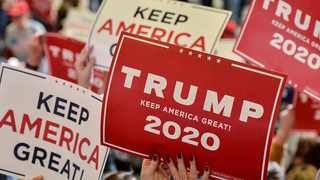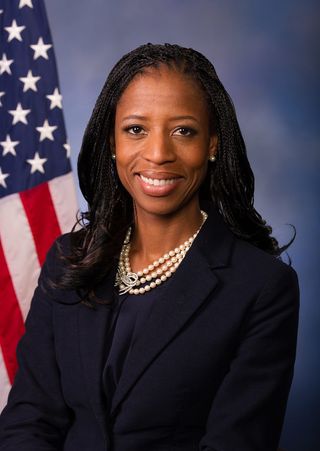Donald Trump is getting stronger. As a black American, I can see how his message is playing among my friends and family. They are warming to him. As a former target of Trump's ire, I understand the difficulty of marking a ballot for Trump given his demeaning criticisms and insulting rhetoric.
Within my own black community, I sense a grudging acknowledgment that Trump’s economic policies, criminal justice reforms, and educational spending have all had a direct positive impact on black communities.
During his State of the Union address and at political rallies around the country, Trump proudly touts his list of accomplishments. He cites the lowest unemployment rate in half a century and the lowest African American unemployment rate in history; 7 million new jobs, including 1.2 million in manufacturing and construction.
He signed the First Step Act, a criminal justice reform that resulted in the releases and sentence reductions for thousands of inmates. In December, he permanently restored annual funding of $250 million to traditionally black colleges and universities.
The language I hear from my Haitian family and friends who are Republican is that they love him. They love his policies. They just wish he would like them back. They are painfully aware of his derogatory comments about their home country and the people who immigrate from it.
When I hear Trump speak at a rally, the State of the Union, or at the Daytona 500 race, I can see how people can feel a sense of pride. It’s easy to get sucked into the positivity and energy coming from those rallies. I just think, "I hope he means us, too." People want to be part of that winning club. Like me, they are just not sure if they are.
The America he talks about is the America we all believe in. We all want to feel like we’re part of that America, even though his Twitter feed makes us feel like we're not.
The adage for anyone running for high office in the US has always been that a voter doesn’t have to like you, they just have to believe you like them to earn their vote. Trump may yet again be rewriting the rulebook.
Democrat candidates seem to run against wealth. Trump seems to run against poverty.
I was a Republican Congresswoman representing Utah from 2015 to 2019. But Trump wasn't a fan. After I lost my Congressional race in 2018, he publicly mocked me, saying "Mia Love gave me no love. Sorry Mia." So I know what it feels like to be put down by the President of the United States. But when I look across the aisle at my choices, I don't see an alternative. I see only people who would dismantle everything about America that works.
Among my conservative and independent friends are some who enthusiastically voted for Trump. Three years later, they remain strong supporters. There are others who reluctantly voted for him or wrote in another name. Many of them remain unhappy with the President's tone and demeanour, but when they look at their choices in 2020, the most obvious contrast is between the pro-prosperity Trump and the angry Democrat candidates.
During the fiery Democratic presidential debate in Las Vegas, candidates angrily discredited each other, demonising their wealth and prosperity. Sen. Elizabeth Warren angrily denounced the ascendant Michael Bloomberg as "a billionaire who calls women fat broads and horse-faced lesbians". Bloomberg said, "the best-known socialist in the country happens to be a millionaire with three houses," referring to frontrunner Bernie Sanders.
While Democrat candidates seem to run against wealth, Trump seems to run against poverty.
At an August 2019 rally in Manchester, New Hampshire, Trump made a comment that resonated with me. Talking about the stock market-fuelled private retirement accounts Americans refer to as a 401(k), Trump said: "You have no choice but to vote for me, because [if] your 401(k)'s down the tubes, everything's gonna be down the tubes. So whether you love me or hate me, you gotta vote for me."
Many on the left were offended by that rhetoric. But for others, it allows them to support someone they may not like. And there are many in America who do not like this president.
But at the end of the day, many are starting to believe that a vote for Trump is a vote for prosperity, and maybe for the first time, American voters of colour will vote for a president they believe is responsible for a growing economy even if they don't believe he likes them.
Trump’s message is resonating and the Democrats' hatred of Trump and steadfast messaging to the hard left is making him a de facto and reasonable alternative.






